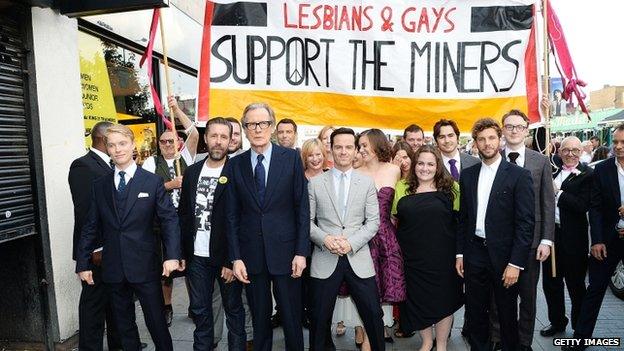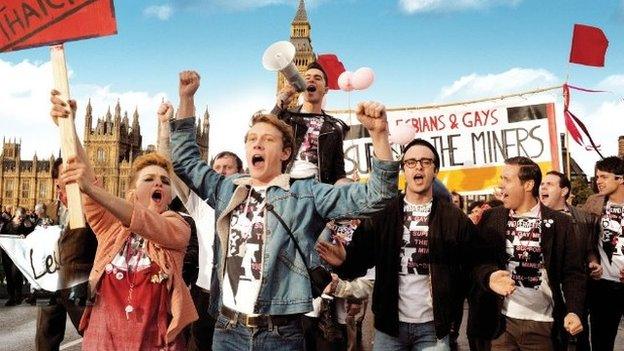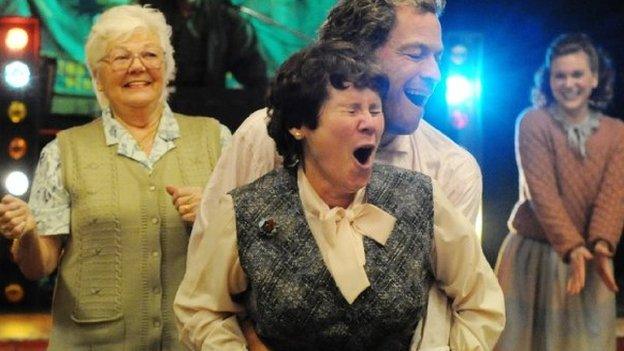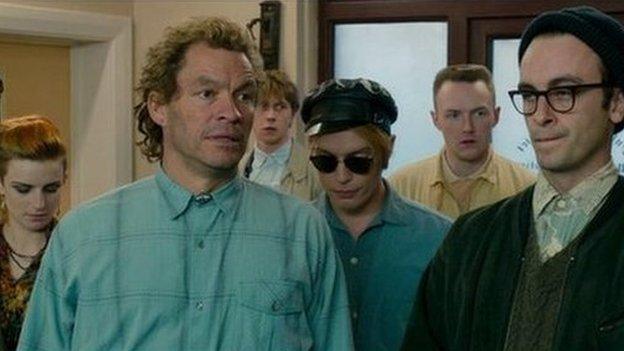Bill Nighy takes Pride in miners' strike movie
- Published

Bill Nighy (centre) was united with his Pride co-stars at the London premiere
The 1984 miners' strike and the gay rights movement may seem like unlikely on-screen partners - but their coming together in Matthew Warchus's film Pride has produced, according to actor Bill Nighy, "the most important British film of recent years".
Bafta-winner Nighy is one of the stars of the movie, which documents the true story of how Lesbian, Gay, Bisexual and Transgender (LGBT) groups became the biggest financial supporters of the miners, who went on strike for more than a year in 1984, in protest against widespread pit closures.
Without the help of donations from outside, many miners faced losing their homes or even being unable to feed their families. Pride focuses on one London group of lesbian and gay activists, who "adopted" a mining community in south Wales, despite initial suspicion and prejudice from residents.
Imelda Staunton, Paddy Considine, Dominic West and Andrew Scott - Moriarty in TV's Sherlock - are also part of the ensemble cast.
"I really think this is one of the greatest scripts I have ever read in my life," says Nighy. "Good scripts are rare and funny ones are even rarer, but I laughed from start finish. And even after several times, I never got through it without crying either.
"l loved it because the two main themes are very close to my heart. If you were asked by your grandchildren what developments in your lifetime made you most proud, one of them might be the civil rights movement in America and the other would be the emancipation of gay men and women.
"You have to remember that Pride is set 30 years ago and the Gay Pride marches weren't a celebration or Mardi Gras, they were political events that would see protesters beaten up by the police.
"Gay men and women were marginalised and victimised . When I was young, people still went to jail for any public display of affection between people of the same sex. It seems bizarre to say that, I've never understood it.
"And now I can stand in a town hall in London and watch two male friends get married and say I love you in a public place, and I find it almost overwhelmingly moving.
"I also remember the miners' strike vividly, I remember a huge amount of support for them from ordinary people and collecting buckets outside the London tube. The strike was a scandal of huge proportions.

"Many of the original members of the LGBT movement, as well as those real life miners from the Dulais Valley they supported, are walking in the front of those scenes over Westminster Bridge," says Nighy
"To find a script that treated those men and women with dignity and respect was a long time coming and it was long overdue. It was a huge relief to read this script and on top of that it was hilarious. I think it is the most important British film of recent years, I really do."
Theatre director Matthew Warchus was brought in to make writer Stephen Beresford's script, who had first heard of the strange alliance between the striking miners and the LGBT groups nearly 20 years previously, and had eventually found an obscure piece of video on You Tube documenting their friendship.
Nighy says: "No-one I have ever met has heard of this story, and yet this is a hugely important slice of British social history. Most of the film is absolutely true - the Pits and Perverts benefit concert we show actually happened. And the coming together of these two groups really had large implications for British society as a whole.
"What is so funny is that we are making a film about failure - because the miners ultimately lost their battle - but we do feature a scene in the film of the Gay Pride march in London in 1985. The full might of the National Union of Mineworkers showed up for the first time in history to that march, and that was a direct result of the gay rights movement and their fundraising.

Imelda Staunton and Dominic West show how the true life events depicted in Pride reveal the steely spirit of the miners and their supporters
"The following year gay rights became enshrined in the Labour Party constitution, and that again was a direct result of the events we show in Pride.
"Many of the original members of the LGBT movement, as well as those real-life miners from the Dulais Valley they supported, are walking in the front of those scenes over Westminster Bridge. That was quite a day. We all cried."
Pride received standing ovations at both its world premiere at the Cannes Film Festival in May, as well as this week's North American premiere at the Toronto International Film Festival, but Nighy believes the most important screening was the private one put on for residents of the Dulais Valley near Swansea, where the real-life events took place and where the film was eventually made.
Many of the people there remember the events depicted in the film.
"The great thing about Pride is that it shows that Margaret Thatcher had it wrong when she said, famously, that there was no such thing as society, just individuals. This is the exact opposite of that terrible remark - it shows our longing to be part of something greater than ourselves, and what big things small acts of kindness can achieve," concludes Nighy.
Pride is released in UK cinemas on 12 September.
- Published2 September 2014
